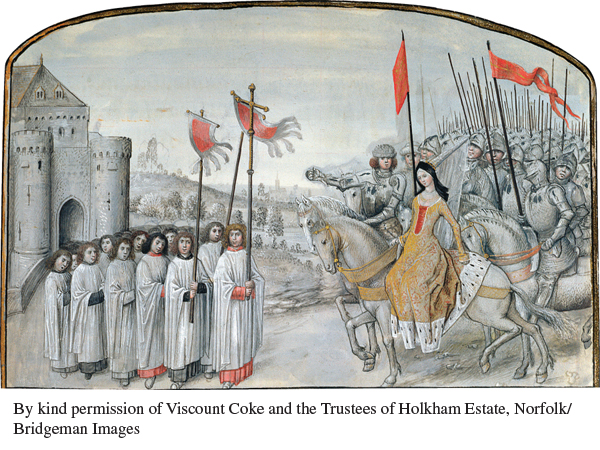Causes
The Hundred Years’ War had a number of causes, including disagreements over rights to land, a dispute over the succession to the French throne, and economic conflicts. Many of these revolved around the duchy of Aquitaine, a province in southern France that became part of the holdings of the English crown when Eleanor of Aquitaine married King Henry II of England in 1152 (see Chapter 9; a duchy is a territory ruled by a duke). In 1259 Henry III of England had signed the Treaty of Paris with Louis IX of France, affirming English claims to Aquitaine in return for becoming a vassal of the French crown. French policy in the fourteenth century was strongly expansionist, however, and the French kings resolved to absorb the duchy into the kingdom of France. Aquitaine therefore became a disputed territory.
The immediate political cause of the war was a disagreement over who would inherit the French throne after Charles IV of France, the last surviving son of Philip the Fair, died childless in 1328. With him ended the Capetian dynasty of France. Charles IV had a sister — Isabella — but her son was Edward III, king of England. An assembly of French high nobles, meaning to exclude Isabella and Edward from the French throne, proclaimed that “no woman nor her son could succeed to the [French] monarchy.” French lawyers defended the position with the claim that the exclusion of women from ruling or passing down the right to rule was part of Salic law, a sixth-

333
The Hundred Years’ War
| 1337 | Philip VI of France confiscates Aquitaine; war begins |
| 1346 | English longbowmen defeat French knights at Crécy |
| 1356 | English defeat French at Poitiers |
| 1370s–1380s | French recover some territory |
| 1415 | English defeat the French at Agincourt |
| 1429 | French victory at Orléans; Charles VII crowned king |
| 1431 | Joan of Arc declared a heretic and burned at the stake |
| 1440s | French reconquer Normandy and Aquitaine |
| 1453 | War ends |
| 1456 | Joan cleared of charges of heresy and declared a martyr |
In 1329 Edward III formally recognized Philip VI’s lordship over Aquitaine. Eight years later, Philip, eager to exercise full French jurisdiction there, confiscated the duchy. Edward III interpreted this action as a gross violation of the treaty of 1259 and as a cause for war. Moreover, Edward argued, as the eldest directly surviving male descendant of Philip the Fair, he deserved the title of king of France. Edward III’s dynastic argument upset the feudal order in France: to increase their independent power, many French nobles abandoned Philip VI, using the excuse that they had to transfer their loyalty to a different overlord, Edward III. One reason the war lasted so long was that it became a French civil war, with some French nobles, most important the dukes of Burgundy, supporting English monarchs in order to thwart the centralizing goals of the French kings. On the other side, Scotland — resisting English efforts of assimilation — often allied with France; the French supported Scottish raids in northern England, and Scottish troops joined with French armies on the continent.
334
The governments of both England and France manipulated public opinion to support the war. The English public was convinced that the war was waged for one reason: to secure for King Edward the French crown he had been unjustly denied. Edward III issued letters to the sheriffs describing the evil deeds of the French in graphic terms and listing royal needs. Philip VI sent agents to warn communities about the dangers of invasion. Kings in both countries instructed the clergy to deliver sermons filled with patriotic sentiment. Royal propaganda on both sides fostered a kind of early nationalism, and both sides developed a deep hatred of the other.
Economic factors involving the wool trade and the control of Flemish towns were linked to these political issues. The wool trade between England and Flanders served as the cornerstone of both countries’ economies; they were closely interdependent. Flanders technically belonged to the French crown, and the Flemish aristocracy was highly sympathetic to that monarchy. But the wealth of Flemish merchants and cloth manufacturers depended on English wool, and Flemish burghers strongly supported the claims of Edward III. The disruption of commerce with England threatened their prosperity.
The war also presented opportunities for wealth and advancement. Poor and idle knights were promised regular wages. Criminals who enlisted were granted pardons. The great nobles expected to be rewarded with estates. Royal exhortations to the troops before battles repeatedly stressed that, if victorious, the men might keep whatever they seized.